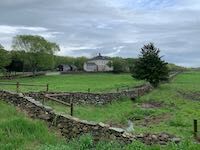Resilience
Why New England's Stonewalls Represent "Yankee Grit"
The walls speak of persevering against life and nature's harshness.
Posted July 28, 2021 Reviewed by Ekua Hagan
Key points
- Grit, perseverance, resolve, and courage help to make us resilient.
- Grit, perseverance, resolve, and courage are also qualities of resilient people.
- "Yankee grit" is the term for the perseverance, courage, and resilience associated with New Englanders.

Returning to my native Connecticut in 2007, after more than two decades in Washington, DC, I became more aware than ever of my “New Englandness.” Life taught me that I also possess the characteristic of the region’s people known as “Yankee grit.”
The Merriam-Webster dictionary defines grit as “firmness of mind or spirit: unyielding courage in the face of hardship or danger.” The definition certainly fits most Yankees I have known. Of course, “firmness of mind” can refer to obstinance or stubbornness. But it’s a mistake to think that’s all it means. Firmness of mind is about perseverance and resolve. It’s about making up your mind, resolving not to let anyone or anything shake you off the path you have chosen toward achieving whatever-it-is you have in mind.
Yankee grit, defined
New Englanders in the colonial era had to persevere in the face of the region’s unpredictable, sometimes harsh weather if they hoped to stake out a good life in the New World. To do so, they needed a vision to keep them going—a vision of cleared farm pastures, for example, and being able to feed and sustain their family.
That vision, their strong work ethic, and their firmness of mind—their grit—prevented them from surrendering to discouragement or despair each winter as the earth heaved up yet more stones that had to be cleared away. (I wrote an in-depth feature about New England’s iconic stonewalls for Earth magazine here.) This is why I look at New England’s thousands of miles of stonewalls as monuments to Yankee grit, symbols of perseverance. It’s why my book and this blog are called “Stonewall Strong.”
What courage is—and isn’t
As for “unyielding courage in the face of hardship or danger,” it’s important to know that courage doesn’t mean fearlessness. It’s not about standing up and shouting threats to the sky for pouring down torrents of rain or snow. It’s not a matter of seeking out dangerous situations to prove you are courageous.
Courage is about taking decisive action in spite of hardship or your fear. It’s about acting bravely when you don’t know what the outcome of a tough situation is going to be. “I learned that courage was not the absence of fear, but the triumph over it,” wrote Nelson Mandela. “The brave man is not he who does not feel afraid, but he who conquers that fear.”
Each and both of my parents, in different circumstances decades apart, said to me, “Be brave, John.” Dad said it in 1989 when I told him that, although I had already lost friends to HIV-AIDS by then, “I don’t know how to lose my father.” We both knew his cancer was terminal then. “Be brave, John,” he said. Mom said it in 2006 after I came out to her about my own HIV diagnosis. “Be brave, John.”
Their admonition to be brave didn’t mean my bravery would prevent the traumatic experiences from happening. It meant that they knew it would take all my emotional resources to face what I was facing—life without my dad, and living with the same deadly virus that killed my friends.
You might call grit, perseverance, resolve, and courage the fruits of resilience. Being resilient gives us the capacity to have grit, to persevere, to be resolved to achieve something, to be courageous.
On the other hand, it takes grit, perseverance, resolve, and courage to become resilient—able to bounce back from adversity, disappointment, and even trauma. Those are the qualities—and actions—that get us through life’s challenges. And as life teaches all of us, we inevitably will encounter other challenges and difficulties ahead.
Knowing all I know about New England’s stonewalls, I feel a sense of reverence when I look at them. I am deeply moved to think about the hard work and perseverance it took to build them without today’s tools and machinery. That's why they represent for me the very definition of “Yankee grit,” what it means to be a New Englander, and to be resilient.


